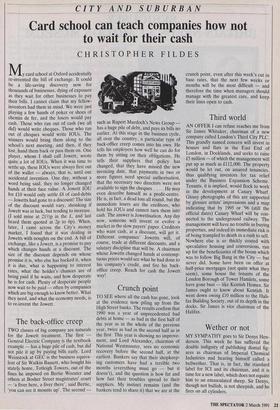The back-office creep
TWO classes of big company are naturals for the Jowett treatment. The first General Electric Company is the textbook example — has a huge pile of cash, but did not pile it up by paying bills early. Lord Weinstock at GEC is the business equiva- lent of Sir Watkin Bassett, who bought his stately home, Totleigh Towers, out of the fines he imposed on Bertie Wooster and others at Bosher Street magistrates' court — 'a fiver here, a fiver there', said Bertie, `you can see it mounts up'. The second — such as Rupert Murdoch's News Group has a huge pile of debt, and pays its bills no earlier. At this stage in the business cycle, all over the country, a particular type of back-office creep comes into his own. He tells his employers how well he can do for them by sitting on their obligations. He tells their suppliers that policy has changed, that they have missed the new invoicing date, that payments in two or more figures need special authorisation, that the necessary two directors were not available to sign the cheques . . • He may even describe himself as a profit-centre. He is, in fact, a dead loss all round, but the immediate losers are the creditors, who hold his IOUs and cannot turn them into cash. The answer is Jowettisation. Any day now, someone will invent or evolve a market in the slow payers' paper. Creditors who want cash, at a discount, will get it. Different companies' Jowetts will, of course, trade at different discounts, and a salutary discipline that will be. A chairman whose Jowetts changed hands at contemp- tuous prices would see what he had done to his company's credit, and fire his back- office creep. Reach for cash the Jowett way!


















































 Previous page
Previous page